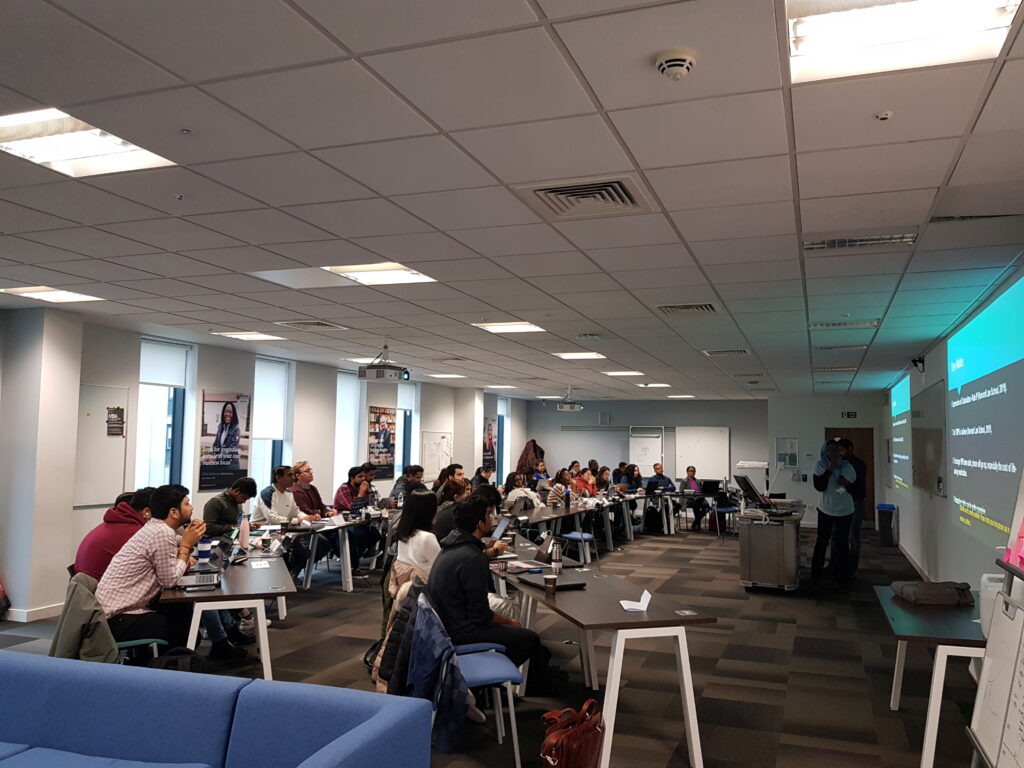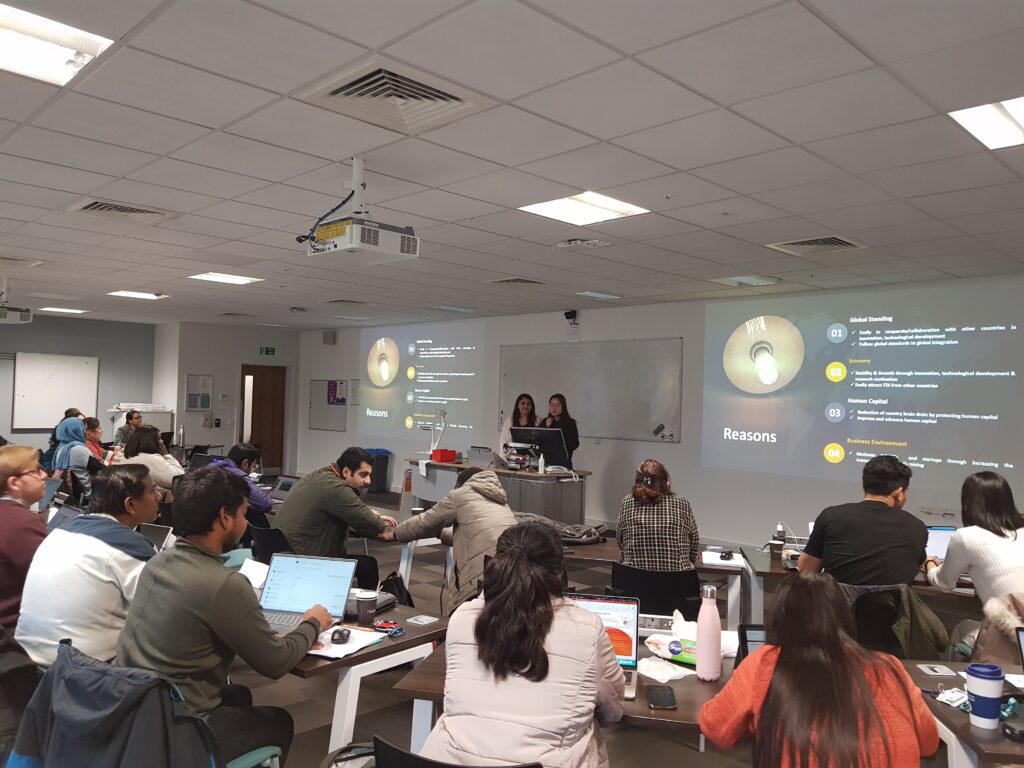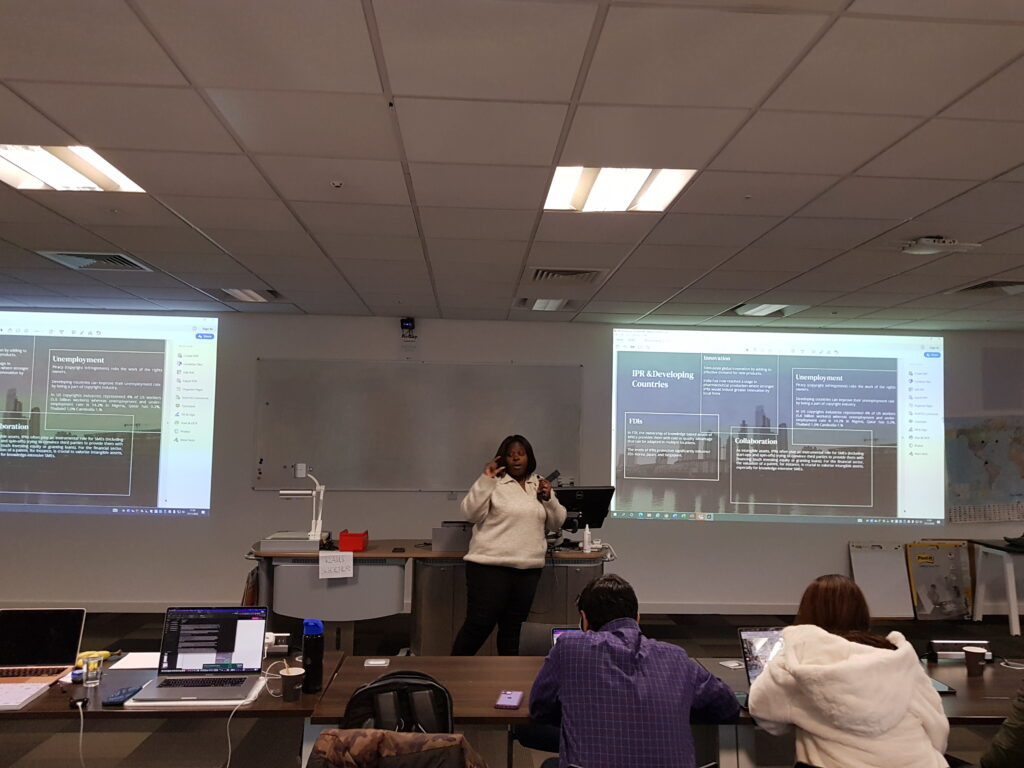Dr Xin Li (Senior Lecturer)
Newcastle University Business School
Faculty of Humanities and Social Sciences
What did you do?
I used in-class debate to deepen students’ understanding of Intellectual Property Right (IPR) protection in developing countries.
Who is involved?
The entire cohort of full time MBA students of the academic year 2022-23.

2022/23 MBA students
How did you do it?
Group allocation
One week before the class, I sent out a Microsoft form asking the students to select which camp – either in support of or against the argument that developing countries should protect IPRs – they would like to be part of. I told them that even if they think they are more balanced than such an either/or stance, they should choose to be either/or for the purpose of the group presentation/debate.
After I collected the students’ camp-selection information, I allocated the class (40 full-time MBA students) into 8 groups, half of which were in support of the argument while the other half against the argument (so, equal numbers of presenting/debate groups).
Group homework
When I communicated the group allocation to the students, I asked them to work with their group members to gather information from any sources such as the internet and academic journal databases in preparation of a group presentation on why they were in support of or against the argument that developing countries should protect IPRs. To make the group presentation/debate engaging and lively, I asked each group to prepare only one PowerPoint presentation slide, listing up to four most important arguments in support of the group’s stance.
Group presentations and debate
When presenting, each group needed to first react to/critique previous group’s arguments, and then present its own arguments. The first presenting group simply presents its own argument and later on react to/critique the last presenting group’s arguments.

MBA students presenting their arguments to the group
Summary and self-reflection
After the completion of the group presentations/debate, I made a summary and pointed out that the purpose of this debate is to facilitate communication and self-reflection. I also asked students to reflect on what they had learnt from the debate. I also encouraged them to self-reflect after the class.
Best performing group nomination
Before the end of the class, I asked all students to nominate the best performing group. I used Mentimeter to collect students’ votes. The group that got the most votes was then given a prize (each group member was given a NUBS-branded notebook, which was supported by the MBA programme’s DPD fund).
Why did you do it?
In my view, in social science, many topics/issues are debatable, meaning people may have different and even opposite opinions that can be justified or reasoned. People often adopt an either/or approach to such a difference in opinions, which often leads to conflict. What people are often unaware of is that our opinions are based on some assumptions that may not be (fully) correct or realistic. Discussion, dialogue, or debate can help people to reveal or realise their assumptions and force them to listen to different opinions, which in turn facilitate self-reflection and learning and ideally a dialectical development of understanding, i.e., forming more comprehensive or better understanding of the focal issue.
I believe debate can facilitate a dialectical development of understanding because different perspectives or opinions are often complementary. In natural science, Niels Bohr’s complementarity principle of quantum physics tells us contrary descriptions of light, i.e., wave and particle descriptions, are complementary to each other and necessary to form a complete depiction of the nature of light. If natural science can accept such a complementarity principle, social scientists should have no objection to such a complementarity principle. When we accept different or even contrary perspectives or opinions (like thesis and antithesis) on a social issue to be complementary, we have a basis for forming a dialectical development of understanding, i.e., forming a synthesis.
Does it work?
The students actively participated in the group presentations/debate. At the summary and self-reflection phase, the students largely agreed with my idea that the purpose of this debate is to facilitate communication and self-reflection and showed their willingness to self-reflect.

A student engaging in the debate
Student Voice
I have informal feedbacks from a few students showing they enjoyed the debate and found it was fun and learning-stimulating. I used Microsoft Forms and Mentimeter to collect students’ responses.
Graduate Framework
The project develops the following attributes:
- Critical Thinkers
- Curious
- Collaborative
- Engaged
